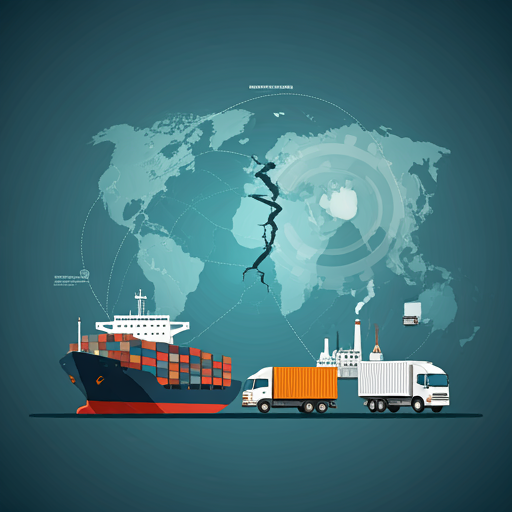Introduction to Global Supply Chain Disruptions
Overview of Supply Chain Dynamics
Global supply chains are intricate networks that connect producers, suppliers, and consumers across the world. Disruptions in these systems can arise from various factors, including natural disasters, geopolitical tensions, and pandemics. Such events can lead to significant delays and increased costs. It’s crucial to understand these dynamics. They affect product availability and quality. A well-functioning supply chain ensures timely delivery of goods. This is vital for maintaining customer satisfaction. The ripple effects can be profound. Have you considered how this impacts your daily life?
Recent Events Impacting Supply Chains
Recent geopolitical tensions have significantly disrupted global supply chains. These disruptions have led to increased volatility in commodity prices. He observed that such fluctuations can strain financial resources. Companies are now facing challenges in inventory management. This complicates their operational efficiency. The impact is felt across various sectors. It’s a concerning trend for many businesses.
The Role of Cryptocurrency in Supply Chains
Blockchain Technology and Transparency
Blockchain technology enhances transparency in supply chains. This innovation allows for real-time tracking of assets. He notes that this reduces fraud risks. Immutable records ensure data integrity throughout transactions. Such features foster trust among stakeholders. It’s a game changer for logistics. Transparency is crucial for compliance.
Cryptocurrency as a Payment Solution
Cryptocurrency offers a viable payment silution in supply chains. It facilitates faster transactions and reduces processing fees. He emphasizes that this can enhance cash flow. Key benefits include:
These advantages can streamline operations. He believes this is essential for competitiveness. Efficient payment systems are crucial.
Impacts of Supply Chain Disruptions on Businesses
Operational Challenges and Costs
Supply chain disruptions lead to significant operational challenges for businesses. These challenges often result in increased costs and inefficiencies. He notes that delays can affect production schedules. This can lead to missed revenue opportunities. Additionally , companies may face higher logistics expenses. Such financial strain can impact overall profitability. Understanding these dynamics is essential for strategic planning.
Effects on Customer Satisfaction and Trust
Supply chain disruptions can severely impact customer satisfaction and trust. Delays in product availability often lead to frustration among consumers. He observes that this can diminish brand loyalty. When expectations are unmet, customers may seek alternatives. Such behavior can result in lost market share. Maintaining transparency is crucial for rebuilding trust. Clear communication fosters customer confidence.
Case Studies: Businesses Affected by Disruptions
Examples from the Manufacturing Sector
Manufacturing companies have faced significant disruptions recently. For instance, automotive manufacturers experienced delays in semiconductor supply. This led to production halts and financial losses. He notes that such interruptions can cripple operations. Additionally, textile manufacturers struggled with raw material shortages. These challenges resulted in increased costs and reduced output. It’s a critical issue for the industry.
Impacts on Retail and E-commerce
Retail and e-commerce sectors have been significantly impacted by supply chain disruptions. He highlights that inventory shortages have led to lost sales opportunities. Many retailers faced challenges in meeting consumer demand. This resulted in diminished customer satisfaction and loyalty. Additionally, shipping delays increased operational costs. Such financial strain can affect profitability. It’s a pressing concern for online businesses.
Strategies for Mitigating Supply Chain Risks
Adopting Flexible Supply Chain Models
Adopting flexible supply chain models is essential for mitigating risks. He asserts that these models allow for rapid adjustments to market changes. By diversifying suppliers, companies can reduce dependency on single sources. This strategy enhances resilience against disruptions. Additionally, implementing technology for real-time data analysis improves decision-making. Such insights can lead to proactive responses. Flexibility is key in today’s volatile environment.
Leveraging Technology and Innovation
Leveraging technology and innovation is crucial for mitigating supply chain risks. He emphasizes that automation can enhance operational efficiency. By utilizing advanced analytics, companies can forecast demand more accurately. This leads to better inventory management and reduced waste. Additionally, integrating blockchain technology improves transparency and traceability. Such innovations foster trust among stakeholders. It’s essential for maintaining competitive advantage.
The Future of Supply Chains in a Cryptocurrency World
Potential for Decentralized Supply Chains
Decentralized supply chains offer significant potential in a cryptocurrency-driven world. He notes that this model enhances resilience against disruptions. By removing intermediaries, companies can reduce costs and improve efficiency. Additionally, smart contracts can automate transactions, ensuring compliance and accuracy. This innovation fosters trust among participants. It’s a transformative approach for future logistics. Flexibility is essential for adapting to change.
Integration of Smart Contracts
Integrating smart contracts into supply chains enhances efficiency and transparency. These self-executing contracts automate processes, reducing the need for intermediaries. He believes this minimizes errors and accelerates transactions. Key benefits include:
Such features foster trust among stakeholders. It’s a significant advancement for logistics. Automation is the future of supply chains.
Conclusion: Navigating the New Normal
Key Takeaways for Businesses
Businesses must adapt to the evolving landscape. Flexibility in supply chains is essential. He emphasizes the importance of technology integration. This can enhance efficiency and transparency. Key strategies include:
Such measures can mitigate risks effectively. Staying proactive is crucial for success. Adaptation is key in today’s market.
Looking Ahead: The Role of Cryptocurrency
Cryptocurrency is poised to play a significant role in future supply chains. He believes it can enhance transaction efficiency and security. By facilitating direct peer-to-peer transactions, companies can reduce costs. This innovation fosters greater financial inclusion. Additionally, blockchain technology ensures transparency and traceability. Such features are vital for building trust. The future is promising for cryptocurrency adoption.
